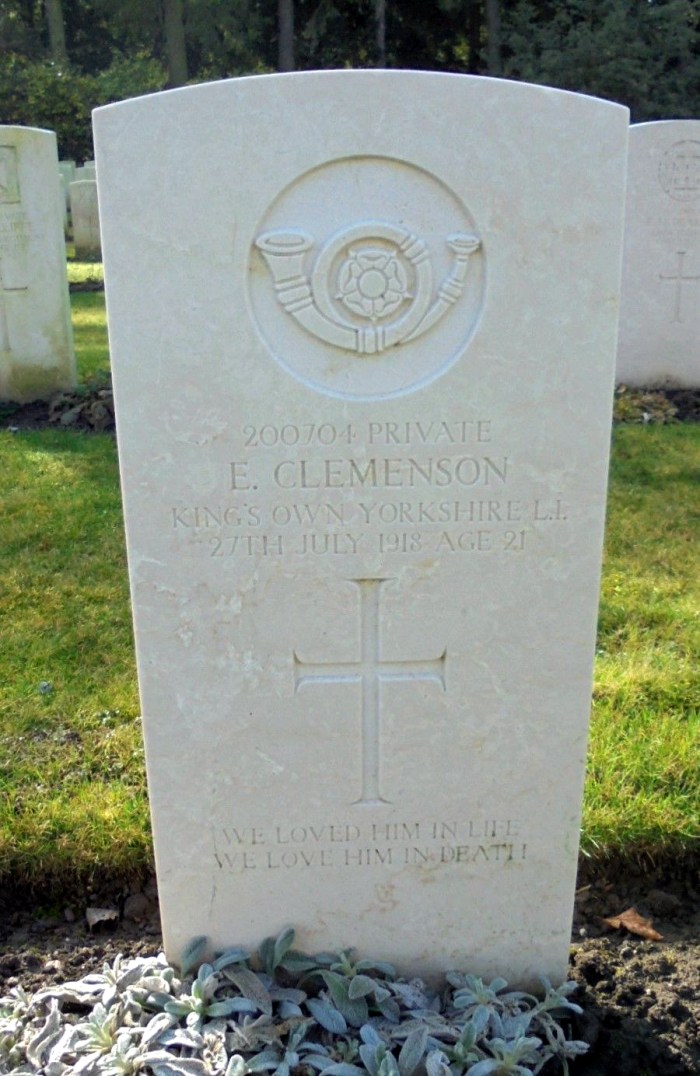Private Edward Clemenson, 200704, King's Own Yorkshire Light Infantry, 1st/4th Battalion
Edward Clemenson was born in the December quarter of 1896, the eldest son of John and Martha Clemenson (nee Batty) of 6 Borough Corner, Cross Lane, Wakefield, who had married at All Saints Church, Wakefield a year earlier in December 1895. John Clemenson was born in Wakefield in 1876, the son of Robert Clemenson who was from Co. Mayo in Ireland.
As a boy John lived at Milton Street at Alverthorpe. In 1893, his father Robert Clemenson was sent to Wakefield prison for one month for the neglect of his family. Two years earlier, the census recorded Robert's absence from the family home, leaving John's mother Maria to care for her five daughters and three sons. Times would be tough for the Clemenson family.
John Clemenson operated a coal cutting machine underground, probably at Roundwood Colliery. Seven children had been born to the couple by 1911 when they lived at Eastwood Buildings, Roundwood, Ossett, but sadly three of them had died. In 1911, Edward Clemenson, then aged 14 years was working as a colliery labourer above ground.
Edward Clemenson joined 1/4 KOYLI probably as part of the Territorial Force that was training at Whitby at the outbreak of WW1. The battalion landed in France on the 13th April 1915.
Edward Clemenson died on the 27th July 1918 from pleurisy when he was a prisoner of war in Germany whilst in Recklinghausen Hospital, the north-east of Essen.
Here is an account from another prisoner of war, Lance-Corporal James Cummings of the 2nd Royal Irish Regiment who spent time in Recklinghausen Hospital1 to give an idea of conditions there for Private Clemenson:
"I went to Recklinghausen Hospital from about the about the 7th to 28th September 1914 after being captured after the Battle of Mons.
There were about 60 prisoners in hospital, of whom 22 were English. My wounds were dressed every fourth day. I received no medicine,and the supply of bandages was scarce. Medical orderlies nursed me.
The lodging was good, being a real hospital. The food was fairly good, not too plentiful, consisting of coffee and one small piece of bread at 8 a.m. Soup and potatoes at midday. Coffee and bread at 7 p.m. The sanitary arrangements were good.
I noticed that French and Belgian prisoners were better treated than the English. I do not remember the names of the doctors that treated me. They were cruel to prisoners when being dressed, and used insulting remarks.I had no operation. A bullet was extracted from my left foot. I had no anesthetic. I do not know why anesthetic was not given to me. I had no clothing supplied by the Germans. I did not ask for any.
Good beds, sheets and blankets; changed weekly."
Edward's two uncles Robert Clemenson and his namesake Edward Clemenson, the two younger brothers of his father John also died whilst serving with K.O.Y.L.I during WW1. Private Robert Clemenson, 1/4 K.O.Y.L.I. born 1880 died on the 23rd May 1915 after the Battle of Aubers Ridge, and Private Edward Clemenson 2/4 K.O.Y.L.I. born 1884 died on the 20th November 1917 on the fist day of the Battle of Cambrai, both are buried in France.
Private Edward Clemenson, 200704, King's Own Yorkshire Light Infantry, 1st/4th Battalion, the son of John and Martha Clemenson of 6, Borough Corner, Cross Lane, Wakefield was buried at Cologne Southern Cemetery Cologne, Stadtkreis Köln, Nordrhein-Westfalen, Germany.

There are now almost 2,500 First World War servicemen buried or commemorated in the Commonwealth plots at Cologne. The Cologne Memorial, located inside the shelter building at the entrance to the Commonwealth plots, commemorates 25 British and Irish servicemen who died in Germany and who have no known grave. Of these, 19 are known to have died as prisoners but their places of burial are not recorded. The remaining six died after the Armistice by drowning and their bodies were not recovered.
References: